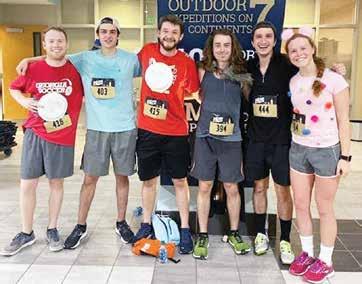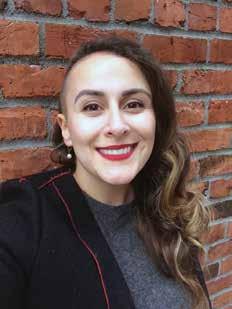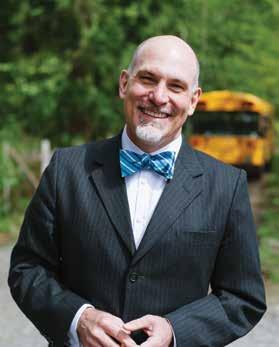
4 minute read
Benjamin Lee, Class of 2015
BY ASHLEIGH ROTH ’16
A 2019 Georgia Institute of Technology graduate, Benjamin has traveled the world working in ministry. He is now a research scientist in a pediatric cancer laboratory at Emory University. I caught up with Benjamin via an email interview.
CAN YOU SHARE WHAT YOU HAVE BEEN UP TO SINCE GRADUATING FROM BEAR CREEK?
After graduating from Bear Creek, I moved to Atlanta to study biochemistry at Georgia Tech. While there I became very involved with Christian Campus Fellowship (CCF). Through CCF, I had the opportunity to study and work abroad in Valencia, Spain, for a semester at En Vivo, a sister campus ministry. I also worked for two summers in Seattle at the Ben Towne Center for Childhood Cancer Research and spent a semester doing forensic DNA research at the U.S. Army primary forensics lab outside Atlanta.
WHAT MEMORY FROM YOUR TIME AT BEAR CREEK DO YOU CARRY WITH YOU TODAY?
One of my favorite classroom moments at Bear Creek was when visitors from other faiths came and spoke during our Senior Capstone class. This experience provided me and my peers with a unique and extremely important opportunity to learn from those who are different from us. As someone who, like much of my class, had grown up on the Eastside and lived within the Bear Creek and Eastside “bubble,” that was an infrequent experience. We learned the value and importance of listening to people who were not like us in every way. Bear Creek taught me to recognize how my faith compelled me to see the world differently and to see the people around me as created in the image of God, despite, or even because of, our differences. That lesson became even more important in college. As an intern, I ministered not just to Christian students, but to all students, whether they were Christian or Muslim, gay or straight, conservative or
Benjamin (right) and a partner ministry intern while working at En Vivo, the ministry in Valencia, Spain

Benjamin and the fitness group he led after a 5k on Halloween
liberal. Their characteristics did not change the fact that they were loved by me and by God. CCF’s most popular event every year (and one of my favorites) was our annual Thanksgiving dinner that was cohosted with the Muslim Student Association. We would have upwards of 250 people crammed into the campus house, taking an evening to be thankful together with people who were each unique in their own ways. Looking back at my time at Bear Creek, I also see a larger thread of tying faith to life, whether overtly in Christian Studies class with Mr. Davison or in a more nuanced way in an AP science class with Mrs. Dunn, Ms. Bell, or Mrs. Graham. While my perspectives have continued to shift and change since then, these were important moments for me as a budding scientist. Now, as I have stepped away from working full-time in ministry, sometimes it can be hard for me to feel like my faith and my work are related, but I remind myself that while the ties to my faith are perhaps more visible when working in ministry, I am not serving God any less as a scientist.
WHAT IS IT LIKE TO BE A RESEARCH SCIENTIST? DID BEAR CREEK CLASSES SHAPE YOUR PASSION FOR SCIENCE?
I had my first taste of “real science” when my AP Biology class toured the lab of the Ben Towne Center for Childhood Cancer Research at Seattle Children’s Research Institute in downtown Seattle during my junior year. Fast forward a couple years and I was in Atlanta studying biochemistry in college. The summer after my second year at Tech, I had the opportunity to intern in the same building and lab that my AP Biology class toured three and a half years earlier. My work as an intern centered on innovative, pivotal treatments for children affected by leukemia. Now, even as I work full time in a different research lab, I continue to use many of the techniques and practices I learned in that first summer at Ben Towne. The thread of scientific research in my life started all those years back in AP Biology, nurtured by the passion and care of people like Mrs. Dunn and Ms. Bell, and continues to my work today. Much like my time at Ben Towne, my work now is fraught with failure and success in equal measure. Each outcome is one step closer to furthering treatment and outcomes for kids ravaged by rare, high-risk cancers.
WHAT LESSON HAS STUCK WITH YOU THROUGHOUT YOUR JOURNEY?
Fail at full speed. It is better to fail because we were trying our best, because we were giving our all, than because we had held back out of fear of making a mistake. The story of both my time in ministry and science is a story of things not working, even while taking every moment as an opportunity to learn and to try again. As I continue to make decisions ranging from how best to proceed with an experiment at work to what I should do with my life moving forward (the plan is medical school), I have had to learn and train myself to push past my fear of uncertainty and failure and make the best decision I can and fail at full speed. I am learning to trust God’s plan for me and God’s continued presence, even when in retrospect I think a different decision might have panned out better. I can’t waste my time worrying about the what-ifs. Each moment, each interaction, is an opportunity to learn something new, to widen my perspective, and to love a bit more.








